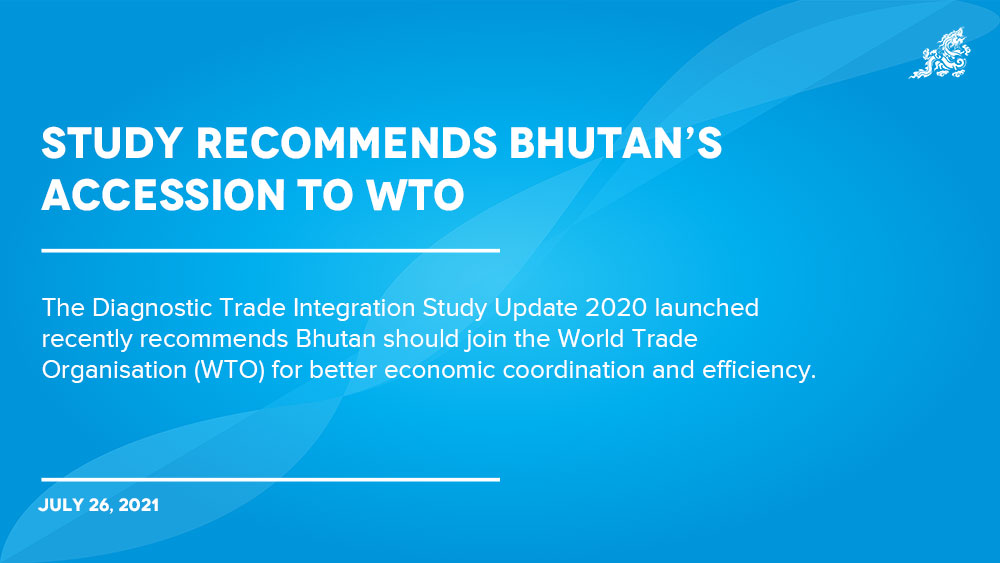MB Subba
The Diagnostic Trade Integration Study Update 2020 launched recently recommends Bhutan should join the World Trade Organisation (WTO) for better economic coordination and efficiency.
Accession to the WTO mandates the country to give binding commitments to liberalise trading and its adherence to many other agreements of WTO. The WTO provides some flexibility for developing countries and least developed countries (LDCs).
Produced by Department of Trade and UNDP Bhutan, the report states that Bhutan as an observer country is already harmonising its domestic laws with WTO rules and that accession to WTO would not overburden its policymaking processes in these areas.
According to the report, the country would benefit in terms of domestic trade reforms that must be carried out to become a WTO member and the rights of being one.
Being a WTO member means that Bhutanese goods would have a non-discriminatory access to markets of other member countries. The country would also have the means to influence the formulation of new multilateral trade rules as the WTO is a forum for trade negotiations.
A WTO member will have access to information on the trade regimes of other members as members are provided a set of transparency instruments, according to the report.
For instance, Bhutan would have access to the WTO Dispute Settlement mechanism to challenge a member’s trade measures that are contrary to its economic and trade interests.
Bhutan would also benefit from enhanced technical assistance and capacity building support from the WTO secretariat to improve the country’s trade system. These will include assistance for enhancing capacity for domestic economic coordination and efficiency to accelerate trade and GDP growth.
Bhutan had completed a considerable level of technical work and reached an advanced stage in the WTO accession process by 2008 but the accession process was suspended in the same year as serious reservations, including over possible impacts on Gross National Happiness (GNH), were raised.
The proponents of the idea are of the view that joining WTO would help Bhutan attract foreign investments. Trading with countries like India on equal footing as WTO members would also generate trade benefits for the country, they say.
Others argue the Bhutanese market could be flooded with foreign goods and there would be unhealthy influx of goods and services. Such competition from foreign goods, they say, may ruin the country’s growing micro, small and medium enterprises (MSME).
The WTO allows separate binding commitments on tariff for agriculture and non-agriculture items. During the Working Party discussions, Bhutan had offered tariff rates of about 50 percent on agriculture items and 26 percent on non-agriculture.
The report states that agreements that were reached during the past negotiations with WTO may have to be negotiated again as Bhutan is scheduled to graduate from LDC in 2023. The country will have more obligations to fulfil after graduation.
The report states Bhutan missed an opportunity to accede to the WTO as an LDC, which might have been done with lesser obligations. “ But given that about 90 percent of its imports come from India at zero duties, such obligations will remain theoretical.”
However, the report reiterates that becoming a WTO member will give Bhutan a larger platform to participate in trade negotiations and seek technical assistance from the WTO and other countries.
Through FDI, Bhutan has also liberalised many services sectors business services, communication, construction, education and financial, as well as transport services.
The report states that it is expected that demand from WTO members will be for financial services and retail. But given Bhutan’s population size, it is not foreseen that commitments in the WTO will result in a surge of investments for commercial presence, it adds.
The report also states that since Bhutan’s graduation from LDC status is imminent, the terms and conditions of its accession may change and WTO members may ask Bhutan to liberalize more than what it would have committed as an LDC WTO member. “For Bhutan, this may imply greater scrutiny of its trade regime and involve undertaking commitments in new areas involving institutional reforms.”
When a significant part of trade is governed through bilateral trading agreements, the need for multilateral trading agreements becomes less appealing, it states.
Small exporting countries like Bhutan will have to evaluate its current trade costs and position and the anticipated benefits vis-a-vis the required commitments if it decides to reopen talks for its accession to the WTO.
Bhutan was granted WTO observer status in April 1998 and application for membership was submitted in September 1999. Bhutan’s Working Party was established on October 6, 1999, to facilitate the country’s accession.
Tengye Lyonpo (Economic Affairs Minister) Loknath Sharma at the launch said that the study would give a way forward for the government not only on economic recovery but also on the long-term economic goals.
He said that some of the recommendations would be implemented immediately while others would take time depending on the need. “The report has come at the right time as the economy needed recovery.”
It was learnt that the government had not held discussions on joining the WTO.
Edited by Tshering Palden


